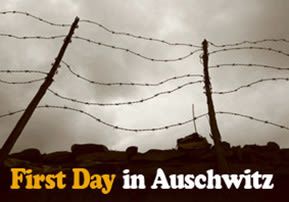
First Day in Auschwitz
We had arrived in the valley of sorrow, in the valley of death. I grabbed my most precious possession, my tefillin, and began to run in the direction I was...

We arrived in Auschwitz on Friday morning, erev Rosh Chodesh Elul, 5704 (1944). We were confused, overcome with fear, and in a state of shock. In the Lodz ghetto, we would rarely have anything to do with the German soldiers, as all matters were directly handled by the Jewish authorities of the Judenrat, headed by Chaim Mordechai Rumkowski. Only when we would look at the barbed-wire enclosure would we see SS guards there, every few yards, pacing slowly, machine-guns nestled casually on their shoulders. Now, in this new place where terror lurked in every corner, there was a sudden swarm of SS troops running to and fro, barking orders at us, shoving us in all directions, beating us indiscriminately. It was frightening beyond words.
"Leave everything! Leave everything behind! Out of the wagons! Schnell!"
From the ghetto we had brought with us backpacks into which we had hurriedly stuffed clothes and other belongings. Now, as we disembarked from the railcars, we were ordered to leave these behind, and to run.
We had arrived in the valley of sorrow — in the valley of death.
I grabbed my most precious possession, my tefillin, and began to run in the direction I was ordered to. At once, I felt a stinging blow to my back and my head. Turning to face my assailant, I realized he was a kapo, one of the many overseers appointed by the SS to help torment us, who began shrieking in a frenzy, "Do you want to get killed right here on the spot?"
Grabbing the tefillin from my embrace, he tossed them, like a baseball, right onto a pile of personal effects that was off to the side. Then, without warning, he shoved me into the mass of people that continued to move from the direction of the train in an endless human flow…
Shortly after, the next phase of our affliction took place, as the segregation commenced. First, the men and the women were separated, husbands from wives, brothers from sisters. Families were ripped apart mercilessly, with no chance for parting words or a hug from a loved one. Children were torn away from their mothers amid panic-filled shrieks of agony. People were pelted right and left to prevent them from running back into the embrace of a parent or child beckoning to them helplessly.
Somehow my mother managed to throw her arms around my neck for a fleeting moment and to utter her final blessing with tears in her eyes. "May the Almighty grant you the same grace that Joseph was favored with in Egypt."
Then we too were forcibly separated, with no time for a goodbye.
Numb and distraught, I felt myself being pushed along with a mass of men until we came face to face with an SS officer, standing on a podium, shiny black shoes on his feet and a whip in his right hand. Almost capriciously, he motioned to each of us in turn, "Right!" or "Left!" As the infamous selektzia took place on this hellish spot, one line grew on either side of the clearing, maintained with the assistance of the SS guards. I proceeded forward, dumbfounded and totally bewildered, not even noticing where I was headed, unaware that a simple word, either "right" or "left," would be the determinant of my life or death.
"Line up in fives!" the SS guards now yelled at us. They told us to march like soldiers. "Links, zvei, drei, vier! Left, two, three, four!" and to march in rhythm, like the well-fed soldiers of the Third Reich. If one of us did not catch on to the beat and the pace, an SS guard would help him to catch on, with the use of a whip or a stick. How I managed to march, I can't recall; my mind was blurred. I simply remember being motioned off to the right and continuing to drag my feet amid the constant screaming and cursing.
Suddenly, from a distance, I heard someone calling excitedly, "Srulek! Srulek!" Surely there were others with the same name, but the voice was unmistakably that of my sister Mirel. I looked around and saw her being led along with a large group of women in the opposite direction.
She was sobbing as she called out to me, "They have taken Mammashee to the left." At the time I did not realize the significance of that statement. I simply assumed that it meant that my mother and my sisters had been separated.
Within the next few minutes, we were herded into an enormous barracks, where we were ordered to stand off to one side…
When a total hush was effected, one of the SS officers positioned himself at the front of the barracks and announced, "You will remove any and all valuables from your pockets and deposit them into these barrels. These include gold, silver, watches, pens or anything else. In a short while, you will each be inspected. Anyone who will be found in possession of any of the aforementioned items will be shot on the spot."
The kapos weaved in and out of the mass of people, shouting and cursing as they conducted a person-by-person inspection. Within moments, as if from nowhere, mounds of valuables began to form at the front of the building, on top of the blanket. A pile of watches here, a heap of gold coins there — pens, golden chains and American dollars.
I had in my pockets my own little cache of personal effects. One item was a precious golden pocket watch on a golden chain, which I had inherited from my beloved grandfather. I also had a few small pieces of gold and some U.S. dollars that my mother had sewn into the lining of my garments.
With a trace of defiance growing inside me, I decided not to allow the cherished pocket watch to fall into the hands of any accursed German. I would rather simply break it. I looked about me to make sure I wasn't seen, and dropped the watch on the floor, then placed my foot over it in order to crush it.
Suddenly a kapo appeared out of nowhere and treated me to a stiff punch in the ribs, and then said, "Pick up that watch and throw it into the barrel." More quietly, he added, "You're lucky that I'm the one who saw you. Had it been another kapo, you would have been on this day hanged from one of the poles outside."
Had I succeeded in carrying out my little venture, the SS would have considered it sabotage. Naturally I wasted no time in picking up the watch and throwing it into the barrel…
Suddenly, we were being shoved into a blockhouse. In Auschwitz, we learned, inmates would be jammed together into one half of the block, while the other half remained empty. Then the kapos shouted out their instructions at us (kapos were forever shouting out instructions in Auschwitz) that we remove our clothes as we were going to the showers to bathe. Anyone who was even slightly reluctant to remove his clothes, or who was slow in doing so, promptly received a different kind of shower – blows from the stick-wielding kapos.
The forbidden question entered my mind, "Master of the Universe, what are You doing with us?," but I could not continue my train of thought, as I noticed a kapo rushing in my direction. Aware of the sticks always poised to beat us, I swiftly removed my clothes and placed them in a neat pile to the side, so I would be able to recognize them later on. When we had still been in the Lodz ghetto, a couple of days earlier, in preparing ourselves for the transport, many of us had donned several shirts, two pairs of pants, sweaters and other garments, figuring that we would need them in the days ahead. Also, my mother had sewn some small pieces of gold coins and a few American dollars into the lining of my jacket.
But I didn't have too long to worry about the fate of my clothes, for sure enough, all our clothing was immediately carried off by the kapos and thrown into large piles. For any of us who dared voice any disapproval, a rain of blows on the head would be the response, along with the explanation, "Fools that you are, you will not be needing your clothes anymore, anyway."
…We were suddenly rushed to another large chamber of the building, where a crew of kapos met us with scissors and hair-cropping machines in hand. Within minutes we were further "refined," as our heads and our entire bodies were completely shaved.
The procedure was torturous as well as humiliating. Using razors and machines that were dull, the kapos, victims in their own right, were under pressure to process a few hundred inmates within a short time. With their blunt instruments, they hurriedly tore out our hair as much as they shaved it off. We emerged from that department of horrors bleeding painfully. To further dehumanize us, they dealt each of us a sudden violent blow on the back so that we doubled over in pain, at which they took the opportunity to check inside our bodies for any items that might have been concealed there…
We were made to file into an enormous room that had dozens of showerheads jutting out from the ceiling overhead. We were all packed into the shower hall, too small to contain the mass of people.
Horror dawning on his face, my friend Yosef turned to me and said, "I heard in the ghetto about a room with showers, but instead of water coming out, people are showered with gas and end up dying from suffocation. It looks like those rumors were true."
I did not know what to answer him. It was too incredible to believe. In the ghetto we had been forced to work for five years to aid the German war effort, and now they were about to kill us, in cold blood. It made no sense at all.
But even the logic of my reasoning did not fully convince me, as we waited for several endless minutes, the smell of sulfur going to our heads and further amplifying our fears. Then, all at once, water came down. At first we were still afraid that perhaps some sort of poison was being rained down on us. But after a few moments of panic, we relaxed somewhat as we realized that the liquid was water indeed. Then, spurred on by a new drive for survival, we began to vie for a better position, to obtain more of the water.
But just as quickly as it had started, the water was shut off.
The initiation process went by rather quickly. We suffered the worst while we stood in line waiting our turns. But there was more to come.
For our next trial we were moved into another room in the same building, an ominously dark room, with a recessed floor filled with blackish liquid. It was an enormous pool of water heavily treated with what smelled like sulfur and disinfectant, into which we were ordered to enter and dip in over our heads, while SS guards watched us from above to make sure that our heads went underwater. The strong chemicals in the water caused the fresh wounds we had acquired from our shearing experience just minutes before to sting excruciatingly.
When we stepped out of the pool we were driven out of the other side of the red brick building, and pushed outside, as we were, naked.
By now it was the dead of night. For a brief moment I stood there, among others like myself, who were perhaps also reflecting on the events of the day, as I was, wondering how to account for the passage of time of the past 12 hours in particular, so terrible and harrowing had been the events that had occurred. The black sky and the chill of the Polish early autumn night brought a shiver to my bones. Suddenly the darkness around us was obliterated by the blaze of powerful floodlights.
The hunger that we all felt gnawing at us was not yet uppermost in our minds, as we experienced the next segment of our transformation into proper citizens of Auschwitz. Off to one side, there were immense piles of various articles of clothing, with a kapo standing next to each pile. We were made to file by, one by one, and receive one item from each pile. First I was given a pair of briefs, then a shirt. From a third pile I was handed a pair of trousers and from a fourth a jacket. The last item I received was something that looked like a rag, and I hadn't the slightest idea of what to do with it. First I thought it might be a sock, but then I saw other people putting theirs on their heads, like hats.
Looking all around me, I realized that everyone was in disguise. We all resembled a bunch of clowns. Here was a tall man in a jacket several sizes too small, and there was a short man with sleeves amply covering his entire hands, and on all of our heads, rags. Were it not for the tragedy of our situation, we could all have enjoyed a bout of hearty laughter while viewing the Purim characters we had become.
We had barely finished getting dressed outside of the bathhouse, when the kapos recommenced their vicious behavior, shouting curses at us, and peppering their words liberally with hefty blows from the whips and sticks that they held. After being beaten once again into total subservience, we were marched to yet another block, where we were supposed to sleep.
Once again, we were squashed into one side of the block. The building was divided along its center by a low red brick wall, a couple of feet in height. On one side of the wall, approximately 500 of us were packed in like sardines, while about half a dozen or so kapos ran around the other side of the room, empty, save for them.
As we scrutinized our surroundings, trying to figure out what would happen next, a long whistle blast pierced the din. One of the kapos approached the low wall, climbed on top of it and called out, "Silence!" As if on cue, the other kapos followed suit, shouting at us to be quiet, and threatening us with blows to the stomach for any word spoken out of turn.
There was instant silence in the room, as we all held our breath, waiting to hear what the kapo had to say. To our amazement, he began to speak in Yiddish.
"Friends. Yidden. We are also prisoners, like you. We went through everything you have gone through today. We beg you for your cooperation. In a moment the SS will be walking in here and each of you will be frisked, and thoroughly inspected. If anyone is discovered having any gold, silver, currency or valuables, he will either be shot on the spot, or hanged on this pole." He paused, to show us a pole standing in the middle of the barracks. I had noticed it earlier, but never guessed its purpose. "Dear Jews, be aware that yesterday there also arrived a large transport from Lodz, and the SS ended up hanging 15 Jews right here in this room. If anyone has any contraband with him, and will admit it right now, of his own free will, we will convince the SS not to punish him."
The silence on our side of the barracks was deafening, no one daring to utter a single word. Neither did anyone speak up in order to admit to having smuggled anything in. A few quiet moments passed dramatically, when all of a sudden the kapo turned to us in a rage.
"Animals! Swine! Do you think we don't know that you have smuggled gold pieces and money into this building? When the SS come in, there will be innocent people shot. Why should any of you suffer because of some other swine? If anyone here knows of anyone who has smuggled valuables in with him, please come forward and tell us. You will be rewarded with food and drink."
Again, silence. Our nerves were frayed to near breaking point. Our bodies were about to collapse, after we had been standing on our feet for two days and a night. In the railcars we had had barely enough room to crouch in, let alone sit. Only now, after having undergone shock after shock, terror after terror, I could ponder the fact that I had not eaten or drunk for two days. And yet here we all were, still standing — in sheer fright of the kapos who stood over us and of the SS guards whose appearance was now apparently imminent.
Then the kapos proceeded to do what they had threatened us would be done by the SS guards. They made their way to our side of the barracks and began to frisk and inspect us, making sure to remove our shoes, which were the only things we had been allowed to keep. There ensued shouts and snarled orders by the kapos interspersed with cries of pain, but no pandemonium broke loose, and we maintained our equilibrium as well as possible.
Suddenly, the lights were extinguished, and an insidious darkness enveloped us. We could still hear moans from people being beaten amid the continuous screaming of the kapos. Then, we heard the head kapo's voice call out above the din, "We have already caught several people who had valuables with them and did not admit to it."
Was this a warning, or a mere observation? We could not determine the answer. We could only listen, as we heard what sounded like a few people being forcibly taken to the other side of the barracks. Then, loud, heavy footsteps pounded in the darkness as new shouting, now in German, could be heard.
"Five people will be hanged at once, and everyone in this block will be severely punished!"
More heavy footsteps and loud breathing were all we could hear in the devastating silence. Then, all at once, a heart-rending cry shattered the stillness. "Shema Yisrael!"
There are no words that exist to describe the dread and shock we all felt at that moment. Immobile, we continued to stand in the dark, pressed one against the other. Then, as time passed, with no further disturbance, our numbness gave way to fatigue. We all began to kneel down, keeping our legs spread apart for fear of losing some of the meager space apportioned to each of us.
Somehow we all made our way down to the floor, crouching rather than sitting, a fitful slumber overtaking our anxieties. We remained in that position, crammed into each other, half awake, poised to hear the slightest sound that could possibly be a harbinger of newer atrocities to befall us.
We were awakened at about 4 o'clock in the morning. In the dim, predawn light we could see no sign of anyone having been hanged. Suddenly we understood that the entire scene played out the night before had been nothing more than a charade. Dreadful theatrics had been enacted by the kapos, Jews themselves who had sunk so low as to prey on our paranoia in order to extract a few precious valuables from a distraught mass of victims, who had already endured so much suffering and anguish. To add to their despicable, mean-spirited behavior, they had abused the holy words of "Shema." We could ascertain from this that a person without the fear of God in his heart will not respect his fellow human beings, but will step on people's heads in order to become rich or just for the pleasure.
That night's ordeal indelibly scarred our hearts. The fear which was instilled in us that night, the absolute terror, so degraded and demoralized us, that no one who was there could ever be totally cured of the injury sustained from the experience.
Nevertheless, life in Auschwitz went on. We did not have the luxury of pensive idling and pondering over events as they occurred… [I tried to compose myself, and commented, "Do you remember the Talmud, where Hezekiah said to Isaiah the Prophet, 'I have a tradition from my ancestors that even if a sharpened sword is placed on your neck, you should not despair of Hashem's mercy'? The Almighty can still help us."]
(Reproduced from "DESTINED TO SURVIVE" – uplifting stories from the worst of times by Israel I Cohen with permission of the copyright holders, ArtScroll/Mesorah Publications Ltd. http://www.artscroll.com)


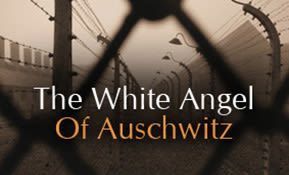
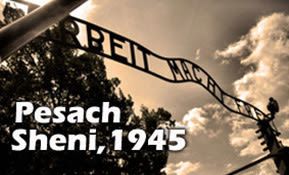
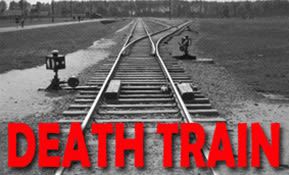


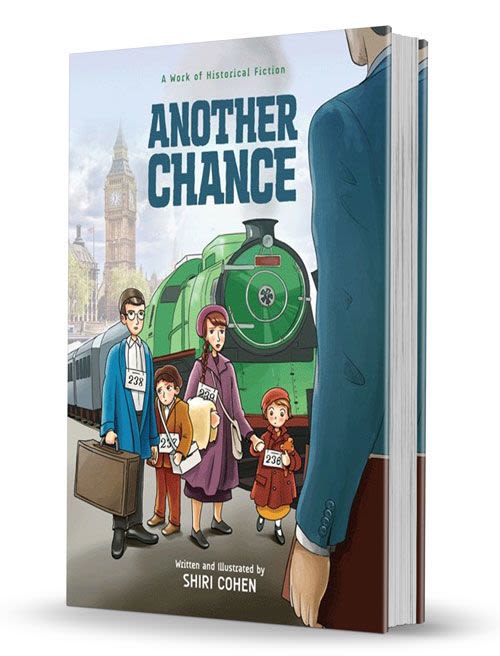
Tell us what you think!
Thank you for your comment!
It will be published after approval by the Editor.